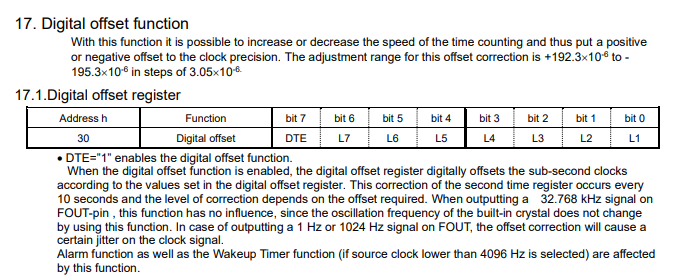POP_UP_MESSAGE_CONTENT


EPSON's real-time clock module RX8130CE power consumption as low as 300 nA, cope with various usage scenarios

With the progress of technology and changing consumer demand, the laptop market continues to show strong momentum as mobility and lightness become the mainstream, on the other hand, performance is improving and features are getting richer. Real-time clock module, as a unit module providing time and timing functions, is an integral part of the laptop. EPSON's real-time clock module RX8130CE, with low power consumption, high precision, small size and other advantages, will have great potential in the laptop industry.
The power consumption is as low as 300 nA, calmly dealing with various use scenarios
When a laptop's system is turned off, not all the circuits are powered off, and the real-time clock is powered by lithium-ion batteries. In order to extend the standby time of the lithium battery, the real-time clock module is generally required to have a very low power consumption. The RX8130CE real-time clock module of EPSON has a typical power consumption value of 300 nA (3V power supply), which can fully meet the standby power consumption requirements of the laptop computer.
The real-time clock on laptops is powered by lithium-ion batteries, and there are usually no small button batteries as backup power. In the case of replacing or adding memory, solid state disk and other scenarios, generally need to connect the lithium battery power supply briefly. Taking 300 nA as the typical power consumption value, after calculation, as long as a 10 uF capacitor is placed in the power supply path for RX8130CE, after the lithium battery is disconnected, the power stored by the small capacitor can be supplied by RX8130CE for 2 minutes, which is enough to support the user to complete the replacement operation. After the laptop is turned on again, the time and configuration information will not be lost to eliminating the trouble of reconfiguration.
Built-in 32.768kHz crystal unit, the factory is done with high precision calibration
RX8130CE The real-time clock module has a built-in 32.768kHz crystal unit, and the frequency accuracy is calibrated at the factory. Compared with most real-time clock chips on the market that require external 32.768kHz crystals, the RX8130CE has better clock accuracy. RX8130CE The clock system is powered at 3.0V voltage, and the typical value of frequency stability at + 25°C ambient temperature is (5 ± 23) ppm, which is equivalent to the deviation of ± 1 minute per month. In the-20 'C~ + 70' C temperature range, the frequency difference of RX8130CE is somewhat larger than the real-time clock module with integrated DTCXO such as RX8900CE. Thus RX8130CE provides the "Digital offset register" register for correcting the frequency bias introduced by ambient temperature changes.

Take the laptop computer as an example, the computer system can obtain the real-time temperature of the motherboard through the temperature sensor on the motherboard. EPSON provides a table describing the relationship between RX8130CE frequency bias and temperature. The computer system can use the obtained temperature value check table to obtain the current frequency bias value of the real-time clock (with the frequency at + 25°C as the reference). The frequency deviation introduced by the temperature change can be compensated for by setting the frequency deviation value to the RX8130CE "Digital ofset register" register (note the positive and negative signs).
Small size, suitable for compact space occasions
The common real-time clock chip on the market, generally SOP8 package, size specification is 6.0x4.9x1.55mm. And EPSON's RX8130CE real-time clock module, the external size is only 3.2x2.5x1.0mm, very small volume. And because there is no need for external crystals, further reducing the area of PCB, it is very suitable for super space and other compact occasions.
In addition, RX8130CE can preset the alarm time, and the output interrupt signal to the point. This function can help the laptop to realize regular boot. RX8130CE Also reserved 4 bytes of RAM, you can store some setting information. Overall, the RX8130CE is a real-time clock module tailored to the laptop industry.












